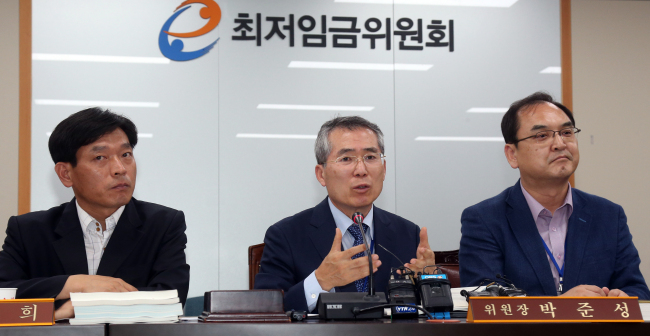The minimum wage for next year has been set at 6,030 won ($5.30) per hour after weeks of debate, despite complaints from both labor and business circles.
Though it marks the highest raise in eight years, labor unions said it was still insufficient to improve low-wage workers’ lives, while employers claimed it put a strain on smaller businesses.
Employers’ representatives, labor experts and government officials of the Minimum Wage Council agreed to increase the minimum wage by 8.1 percent next year at the final negotiations that continued into early hours of Thursday.
 |
| (Yonhap) |
The labor bloc boycotted the meeting in opposition to labor experts’ earlier suggestion to put a cap on how much to raise the minimum wage.
At a previous round of talks that dragged on until early Wednesday, labor experts proposed that the rate for the minimum wage hike should be between 6.5 percent and 9.7 percent, prompting the workers’ representatives to walk out of the negotiations in protest.
The Minimum Wage Act stipulates that at least one-third of representatives from trade unions and employers should participate in a vote to decide the minimum wage. But if one party refuses to attend the negotiations more than once, the vote can go ahead without that party.
Out of 27 representatives, the remaining 18, including nine labor experts and seven employers, put the revised proposal to a vote Thursday morning without laborers, where 15 voted in favor, one against and two abstained.
The 8.1 percent wage hike marks the biggest jump since President Park Geun-hye took office in 2013. This year’s minimum wage saw a 7.1 percent rise from a year earlier, while last year‘s rate was raised by 7.2 percent from the previous year.
The hourly wage of 6,030 won translates to 48,240 won a day and 1.26 million won a month for those who work eight hours a day. The pay raise will affect an estimated 3.42 million low-income workers, according to the Minimum Wage Council.
But the 8.1 percent hike immediately sparked protests from both the labor and business blocs.
“The 70 million low-income earners, who have expected a double-digit growth in the minimum wage as proposed by Finance Minister Choi Kyung-hwan, feel betrayed and disappointed by the decision,” the Federation of Korean Trade Unions, the nation’s largest trade union, said in a press release. Choi has supported a “fast-paced” hike in the minimum wage to spur wage-led economic growth through increased domestic spending.
The Korea Employers Federation, for its part, expressed deep regret over what it viewed as a “drastic increase” in the minimum wage.
“We regret the decision to drastically raise the minimum wage, defying small and medium-sized employers’ complaints of (the need of help for) survival amid worsening economic conditions,” the employers’ organization said, pointing out that the 8.1 percent increase was far more than the inflation rate of 0.5 percent.
Meanwhile, labor and business circles agreed to stipulate both hourly and monthly wages in the employment contract to protect laborers’ right to be paid for 48 hours of labor when working 40 hours a week.
Currently, only hourly wages are written in the contract, which labor experts and workers in the council saw as giving leeway for employers to dodge legal obligations.
Negotiations among employees, employers and labor experts collapsed several times due to continued clashes over the extent of the hike, failing to meet a June 29 legal deadline.
The labor unions initially demanded a 79 percent rise from the current minimum wage at 5,580 won to 10,000 won, while employers campaigned for a freeze.
But after the negotiations failed to meet a legal deadline, both sides presented revised proposals to secure a deal through additional discussions.
At Wednesday’s meeting, the business leaders suggested that the minimum wage be 5,715 won, while laborers proposed 8,100 won.
The Korea Employers Federation has claimed that the minimum wage has risen too rapidly and it needs to be stabilized, voicing concerns over possible job losses and soaring production costs, especially for smaller companies.
The nation’s trade unions have maintained that the hike would curb the nation’s income inequality, improve living conditions for low-income workers and revitalize the faltering domestic economy by boosting consumer spending.
Since the government adopted the minimum wage in 1989, the Minimum Wage Council, a trilateral committee of employers, employees and labor specialists including labor-related government officials, has set the minimum wage through discussion.
This year, the discussion began in early June.
There is still room for a change to the rate as the Ministry of Employment and Labor offers a 20-day period for both labor and management to express their objections before making public the agreed minimum wage rate for next year on Aug. 5.
By Ock Hyun-ju (laeticia.ock@heraldcorp.com)



